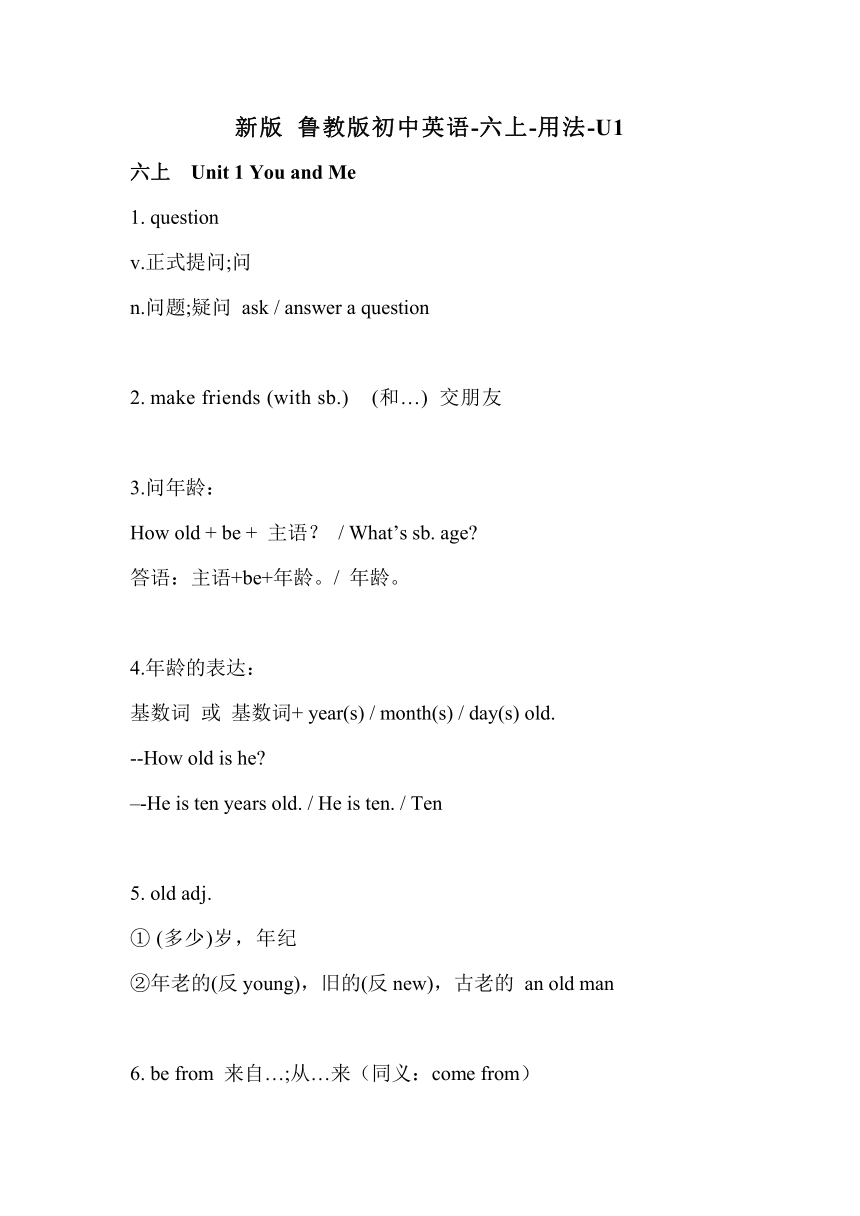
新版 鲁教版初中英语-六上-用法-U1 六上 Unit 1 You and Me 1. question v.正式提问;问 n.问题;疑问 ask / answer a question 2. make friends (with sb.) (和…) 交朋友 3.问年龄: How old + be + 主语? / What’s sb. age 答语:主语+be+年龄。/ 年龄。 4.年龄的表达: 基数词 或 基数词+ year(s) / month(s) / day(s) old. --How old is he –-He is ten years old. / He is ten. / Ten 5. old adj. ① (多少)岁,年纪 ②年老的(反young),旧的(反new),古老的 an old man 6. be from 来自…;从…来(同义:come from) 7. get to know认识;了解 (通过交流、观察或亲身经历逐渐实现) 8. full adj. 完整的;a full story 满的(反empty); (be) full of 饱的(反hungry); I’m full. 忙的(同busy反free) a full day 9. full name 全名 last name姓氏(=family name) What’s one’s last / family name 10. first name名字 (=given name) 中英文名字的写法:中文:姓+名 / 英文:名+姓 11. grade n.年级;等级(成绩或评分) Grade one 一年级 get good grades 取得好成绩 12. classmate 同班同学(mate 伙伴) roommate, deskmate, teammate 13. --What class are you in? --I’m in Class 3. Which class are you in, Peter? 14. class teacher班主任 Who’s your class teacher who pron.谁,什么人 提问时,如不知道是谁或不确定数量时,谓语动词常用单数 15. mistake n.错误;失误 by mistake 错误地;无意中 (粗心) make a mistake/make mistakes (in…) 犯错;出错 Don’t worry. We all make mistakes. 没关系,我们都会犯错。 learn from mistakes 从错误中学习(吸取教训) v.误解,弄错 mistake...for...把……错认成…… The teacher often mistakes me for my twin brother. 老师常把我误认为是我的双胞胎弟弟。 16. job 与 work job (cn) 具体的工作或职业(强调什么工作) work (un.)生活或工作中从事的具体的体力或脑力劳动,即各类工作(强调工作行为); vi. Mary has a good job in a bank. I want to find a job in Beijing. He has a lot of work to do every day. 17. country /'k ntr / n. 国家 China is a large country. n. 乡村(=countryside) (常用单数并与the 连用) He lives in the country. adj.乡下的;民间的 country music 乡村音乐 country life 乡村生活 18.same adj. 相同的;一模一样的 (与the连用)(反:different) look the same 看上去一样 feel the same way 感同身受 in the same class 在同一个班级 in the same way 以相同的方式 the same as … 和…一样 the same taste 相同的品味/味道 19.avourite (AmE: favorite) adj.最喜欢的;特别受喜爱的(只做定语,修饰名词)= like …best n.特别喜爱的人或物(pl. favourites) What’s your favorite color = What color do you like best? Music is my favorite. = I like music best. My favorite subject is science. = I like science best. 20. both pron. 两个; 两个都 (位置:情be后,实义动词前) (反义词 neither) both of +可数复/人称代词复数宾格 “...两者都”,做主语视作复数(谓语动词用复数) 21. 也:also, too, either either (也)不;否定句句末,其前加逗号 too 肯定句,常置于句末,其前加逗号; 作为插入语置于句中,前后都加逗号 also 肯定句 系/助/情后,行为动词前; 位于句首,用逗号与句子分开,“还有,另外” I like English, too. He can also play the guitar. Tom also likes drawing. He doesn't like playing chess. I don't, either. Now she lives in Chengdu with her parents. 22. live adv. / ... ...
~~ 您好,已阅读到文档的结尾了 ~~